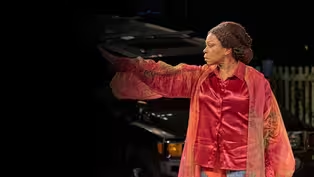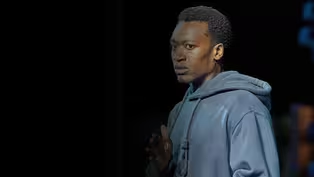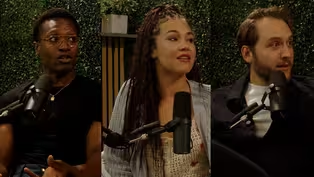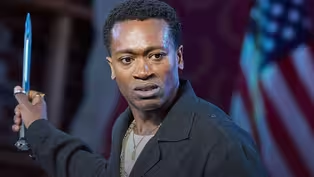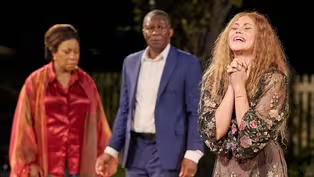
Hamlet in Today's World
Clip: Season 51 Episode 19 | 8m 17sVideo has Closed Captions
The cast of Hamlet discuss what it means to bring the story of Hamlet into the modern day.
The cast of Hamlet (Ato Blankson-Wood, Solea Pfieffer, and Nick Rehberger) discuss what it means to bring Shakespeare's "Hamlet" into the modern day.
Problems playing video? | Closed Captioning Feedback
Problems playing video? | Closed Captioning Feedback
Major series funding for GREAT PERFORMANCES is provided by The Joseph & Robert Cornell Memorial Foundation, the Anna-Maria and Stephen Kellen Arts Fund, the LuEsther T. Mertz Charitable Trust, Sue...

Hamlet in Today's World
Clip: Season 51 Episode 19 | 8m 17sVideo has Closed Captions
The cast of Hamlet (Ato Blankson-Wood, Solea Pfieffer, and Nick Rehberger) discuss what it means to bring Shakespeare's "Hamlet" into the modern day.
Problems playing video? | Closed Captioning Feedback
How to Watch Great Performances
Great Performances is available to stream on pbs.org and the free PBS App, available on iPhone, Apple TV, Android TV, Android smartphones, Amazon Fire TV, Amazon Fire Tablet, Roku, Samsung Smart TV, and Vizio.
Buy Now
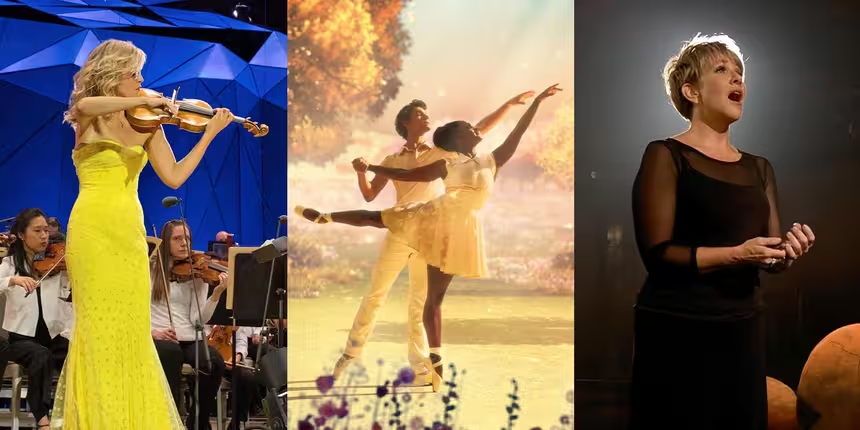
Great Performances Newsletter
Subscribe to the Great Performances newsletter to keep up with the latest full episodes to stream, exclusive content, and more!Providing Support for PBS.org
Learn Moreabout PBS online sponsorshipAlas, poor Yorick.
Okay, so Much Ado About Nothing which Kenny directed pre-pandemic and Hamlet now, semi post-pandemic right?
But set in the same household in Georgia.
Hmm.
Right.
And so we have politicians and people of higher states living in this home.
And so with that sense of royalty and that sense of governmental household, uh, how does Hamlet play out in, in, in that environment and especially in pretty much a, uh, a black ethnic cast?
How does that live with you and the identity of who Hamlet is in this space?
Well, I think they're what what is the hold over from Shakespeare's original writing, and in that, that sort of, um, is amplified by all of those things that you've just mentioned, is that -- is this sense of obligation, this sense of duty, which I think very much exists, exists in Shakespeare's original text, but also in, in the context of a well-to-do black political family.
Right.
There's a there's a sense about, uh, appearances and keeping up appearances and propriety.
We talked a lot about his softness, Kenny and I, early on, and just like I walk into the world, into the room with, like, that's my energy.
I like to be soft in the world.
- Yeah.
And it was important to me that Hamlet had that.
But when we think about young black men being soft, specific to like very public facing families there's this idea that you can't be that.
That alone is a disruption.
And I think that that really relates to...
I think in that in that -- I think it gives us Act One Scene II that Hamlets sort of listing of all his inky cloak and -- he is disrupting a wedding, like a wedding celebration.
Rightly so, though.
- Yes naturally.
But I think that that also then connects to the disruption of his softness as we sort of like molded it around this like black political family.
- Yeah.
Yeah.
And does that disruption continue through the play?
Oh, I Oh, I think so.
Yeah.
I think it's I think the volume on that disruption gets a way turned up once he's like, Wait... You married my mom.
You murdered my father.
Like, once that knowledge comes in, he's like, Oh, oh, I'm tearing this house down.
Yeah.
Good Hamlet, cast thy knighted color off.
Do not forever with thy veiled lid seek for thy noble father in the dust.
Thou knowest tis common all that lives must die.
Passing through nature to eternity.
Aye madam, it is common.
If it be why seems it so particular with thee.
Seems, madam?
Nay it is I know not seems.
Did you find... Did you find the setting or the the the time period to assist you or did it did it fill you with something different?
I think so.
And I think that's another thing that, that came with time, because I think originally my conception of Shakespeare and my experience of doing Shakespeare was doing it in the time period with a British accent.
- Yes.
And so and I felt like I was good at that.
So I had to remove some stuff.
Then and be like, how do I bring myself to this?
And I think that the setting just makes it more immediate and it's very real.
We're dealing with very real issues.
- Yes.
We don't have to be beholden to a world or an era because it's our world.
And I think that is helpful.
Yeah.
And I think, you know, for the audiences who come to the Delacorte, 1800 of them or so, you know, every night, I think that, dare I say, Hamlet became more accessible.
I think so.
That was a piece of feedback that I got from a lot of people who came to see the show.
It's like they saw people performing Shakespeare in a way that was just immediately relatable.
My Lord, I will hit him now.
- I do not think.
And yet it is almost against my conscience.
Come for the third Laertes.
You do but dally.
My, when I was looking at what our production was representing and what it was meaning to me in 2021, I feel like, you know, the world was just, just starting to come back as if everything was normal.
Like we said, All right, get back to work, get back to it.
Because we were vaccinated and whatever, like the world is is getting back to it.
When in reality, a million people passed away and we never got to really take the time collectively to feel that grief.
And I think Ophelia is the only character in this show that is like actually having the correct response to what happened.
I am going to grieve.
Yeah.
- You are going to bear witness.
And my grief you may not recognize my grief as something that you're experiencing, but I am doing what I need to do.
Right.
And you might not have the patience for it, but I don't care.
You will be here and you will watch me.
And you will listen to me.
And you will bear witness to the fact that I am in mourning and I am in grief.
And I have no way of making sense of something so horrific.
And so in that way, I think it was you know, I didn't want to think of her as crazy, you know, or mad.
As much as like, No.
Okay.
You didn't listen to me when I spoke to you clearly, you didn't listen to me then.
Try this.
- Try this.
Let's see how you feel about this little ditty for you.
You know.
So it was like a whole different.
Like, I'm going to scream at the top of my lungs.
- Yes.
And I'm going to make you pay attention and we're going to stop what we're doing for a second because something horrible has happened.
O rose of May, dear maid, kind sister, sweet Ophelia!
O heavens, is t possible a young maids wits Should be as mortal as an old mans life?
♪ Fare you well, my dove.
♪ Hadst thou thy wits and didst persuade revenge, It could not move thus.
You must sing.
♪ A-down a-down ♪ I felt like contemporizing this play gave a very specific space for a very specific experience of these last few years.
So I really felt like for me at least, I was able to really look back on these few years and the amount of grief I was holding and the amount of loneliness and the amount of confusion, and take all of that and pour it into this character because it really felt like there wasn't much of a translation that needed to happen.
Whether tis nobler in the mind to suffer the slings and arrows of outrageous fortune, or to take arms against a sea of troubles, and by opposing end them.
Ato Blankson-Wood and Lorraine Toussaint in "Hamlet"
Video has Closed Captions
Clip: S51 Ep19 | 2m 51s | Ato Blankson-Wood (Hamlet) and Lorraine Toussaint (Gertrude) in The Public Theater's "Haml (2m 51s)
Ato Blankson-Wood Performs Hamlet's "To be, or not to be"
Video has Closed Captions
Clip: S51 Ep19 | 2m 35s | Ato Blankson-Wood performs "To be, or not to be" at the Delacorte Theater. (2m 35s)
Video has Closed Captions
Clip: S51 Ep19 | 14m 9s | The cast of Hamlet discuss what shapes their characters' interactions with one another. (14m 9s)
Video has Closed Captions
Preview: S51 Ep19 | 30s | Experience this Shakespearean classic directed by Tony Award winner Kenny Leon. (30s)
Solea Pfeiffer performs as Ophelia in The Public Theater's "Hamlet"
Video has Closed Captions
Clip: S51 Ep19 | 2m 37s | Solea Pfeiffer performs Ophelia's flower monologue from Hamlet Act IV Scene 5. (2m 37s)
Providing Support for PBS.org
Learn Moreabout PBS online sponsorship

- Arts and Music
The Best of the Joy of Painting with Bob Ross
A pop icon, Bob Ross offers soothing words of wisdom as he paints captivating landscapes.












Support for PBS provided by:
Major series funding for GREAT PERFORMANCES is provided by The Joseph & Robert Cornell Memorial Foundation, the Anna-Maria and Stephen Kellen Arts Fund, the LuEsther T. Mertz Charitable Trust, Sue...
